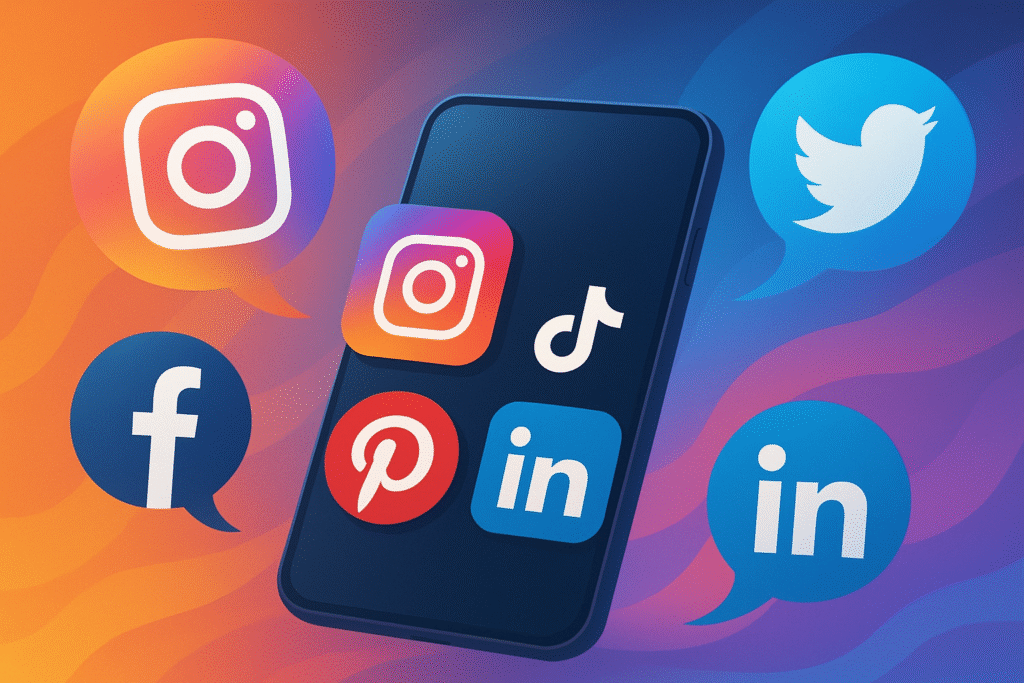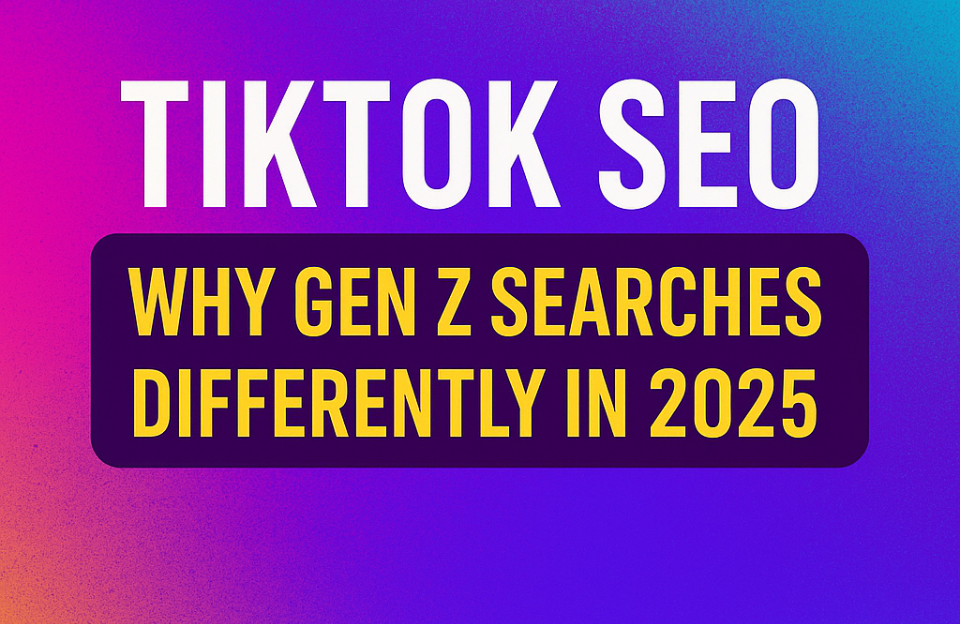Social media is no longer just a place to chat with friends. It is a core part of online marketing for brands of every size. A strong social media presence helps you reach your target audience, build trust, and drive measurable results. Popular social media channels: Instagram, TikTok, LinkedIn, Facebook, Pinterest, and YouTube — let you meet people where they already spend time. This guide explains what social media marketing is, how it works, and how to plan effective social media marketing campaigns in 2025. You will also find a practical mini case, a 30-point checklist, and working templates to move from ideas to execution.
What is Social Media Marketing?
Social media marketing (SMM) is the use of social media platformen to promote products and services, build relationships, and create demand. It combines organic content, paid media, and community management. At its core, SMM is simple: publish the right social media post for the right audience at the right time, then learn from the data and improve.
In practice, effective SMM creates a loop: plan → produce → publish → participate → measure → improve. Brands that treat social as an ongoing system, not a one-off campaign, see compounding results over time.
Core elements
- Strategy: goals, positioning, target audience, and a clear plan for social media accounts.
- Content: images, short-form video, carousels, stories, and live sessions that solve problems or entertain.
- Community: replies, comments, and direct messages that show your brand listens and acts.
- Paid media: targeted ads to expand reach, test fast, and support retargeting.
- Analytics: track what works, stop what does not, and scale the winners.
Benefits of Social Media Marketing
-
Brand awareness
Stay visible where your audience spends time. Clear, consistent messages make your brand easy to recall.
-
Trust and authority
Educational posts, case notes, and customer stories show what you stand for. Over time, authority grows.
-
Qualified website traffic
Strong hooks and clear calls to action move people to landing pages, articles, and product pages.
-
Lower cost to test ideas
Compared to offline channels, social lets you test offers and creative quickly with small budgets.
-
Insights for product and content
Comments and questions reveal objections, language, and needs. Build content that people ask for.
-
Sales support and social commerce
Native shopping tools reduce friction from discovery to purchase and support lower-funnel results.
How Social Media SEO Works
People search inside social apps and on the open web. You need to be easy to find in both places.
- In-app discovery: use clear keywords in profiles, captions, and alt text. Keep each post focused on one topic.
- Open-web impact: social can raise branded searches, earn mentions, and attract links. These signals support search visibility.
- Ease of use: add descriptive captions and on-screen text so videos work with sound off. Use simple language and readable text sizes.
Connecting Social Media and SEO
Social does not act as a direct ranking factor, but it reinforces SEO through complementary signals and outcomes:
- Traffic generation: social posts and profiles drive users to high-quality, in-depth content.
- Link earning: shareable assets (original research, templates, charts) can attract organic links.
- Brand signals: increased visibility boosts branded searches and recognition.
Building a Social Media Marketing Strategy
-
Set the business goal
Choose one primary outcome: awareness, engagement, lead volume, qualified demos, or revenue. Tie each to a number and a date.
-
Define the target audience
Document who you want to reach and what they need. Note jobs-to-be-done, questions, and objections. Use the same words your audience uses.
-
Choose channels
Select platforms that match your offer and content strengths. Instagram for visual products, TikTok for short-form stories, LinkedIn for B2B proof.
-
Decide your content pillars
Pick 3–5 themes. For example: Education, Product Proof, Community, Brand Values, and Behind the Scenes.
-
Build your production system
Batch ideas, scripts, and shoots. Create a weekly cadence. Reuse one idea across formats.
-
Plan campaigns
Run time-boxed social media marketing campaigns around launches, seasons, or promotions. Write a one-page brief with objective, audience, offer, message, formats, and metrics.
-
Create the posts
Keep copy tight. Lead with a hook. Show the product in use. Use captions people can scan. Aim for a strong first three seconds in video.
-
Publish with a reliable cadence
Consistency beats bursts. A realistic plan is 3–5 posts per week per channel, plus daily community time.
-
Engage and moderate
Respond to comments and messages. Thank people who share. Move complex cases to email or chat.
-
Learn and improve
Each month, review the top and bottom posts. Keep what worked. Fix what did not. Repeat with better inputs.
Content System: Posts, Formats, and Cadence
Choose formats you can produce well, then increase quality over time.
- Short-form video: TikTok, Reels, Shorts. Lead with a quick benefit or problem.
- Carousels: teach a process step by step; end with a simple next action.
- Single images: show clear product benefits and real use cases.
- Live: launches, Q&A, interviews.
- Stories: quick updates, polls, and behind-the-scenes.
Writing the Social Media Post
- Keep sentences short. Use verbs. Avoid filler. One idea per post.
- Name the audience and the outcome. Example: “Busy founders: cut your reporting time in half with this free template.”
- Use plain words. Replace jargon with simple terms.
- Use alt text and captions to make posts clear and easy to consume.
Measurement and ROI
Track both on-platform results and website outcomes. Focus on a small set of numbers you can act on.
- Reach and impressions: how many people you touched.
- Engagement rate: how many interacted relative to reach.
- Video completion rate: how many finished the clip.
- Click-through rate: how many visited your site.
- Conversions: leads, trials, purchases.
- Cost per result and ROAS: key for paid.
Use UTM parameters on links. In analytics, group traffic by campaign and creative. Compare outcomes by idea, not only by channel. Match spend to results. Find the posts and ads that create leads that actually close. Remove steps that do not move the needle.
Tools and Team Workflow
- Creation: phone camera plus a basic microphone. Choose one editing tool and master it.
- Planning: keep a shared content calendar and store scripts, assets, and approvals in one place.
- Publishing and listening: use native tools or a simple scheduler. Check comments daily.
- Analytics: track platform metrics and web conversions in one weekly review.
2025 Trends to Watch
- Short-form video remains the default format; show value in the first seconds.
- Creator partnerships get more structured; start with smaller creators and clear usage rights.
- Messaging and chat-commerce expand; quick answers drive action.
- On-platform search matters more; use simple keywords in profiles and captions.
- Hyper-personalization with consent; match content and offers to behavior and stage.
Dutch insert: social media marketing biedt schaalbare manieren om campagnes te testen en jouw social media accounts te laten groeien zonder grote budgetten.
Mini-Playbooks (B2C and B2B)
B2C launch playbook (two-week promo)
- Audience: recent product page viewers (60 days) plus lookalikes.
- Message: one clear benefit and one proof point.
- Formats: two short videos, one carousel tutorial, two story sets with polls.
- Cadence: daily posts; small ad spend to find the winning hook in three days; scale the winner.
- Measurement: add-to-cart rate, purchases, cost per purchase.
B2B demand playbook (qualified demos)
- Audience: defined roles and industries.
- Message: a painful problem and a short path to value.
- Formats: one problem-solution video, one carousel with a mini framework, one founder post with a case note.
- Cadence: three posts per week on LinkedIn; retarget visitors who read at least 50% of the article.
- Measurement: demo requests, pipeline created, win rate.
Mini Case: From Flat to Performing in 60 Days (Illustrative)
Context: A small DTC skincare brand spent €3,000 per month on social without a clear plan. Results were flat: low reach, low clicks, and almost no sales attributed to social.
Diagnosis: No content pillars, uneven posting, and no tracking on links. Creative lacked clear hooks and showed product without context.
Plan: The team defined one goal (20 purchases per week), one target audience (women 20–34 with sensitive skin), and three content pillars (Education, Routines, Proof). They cut channels to Instagram and TikTok only. They built a simple calendar: four posts per week and two short videos. All links used UTM tags.
Actions by week:
- Week 1–2: write hooks, shoot UGC-style videos, and publish carousels that teach a routine. Enable add-to-cart and purchase tracking. Start a €20/day testing campaign with five variations.
- Week 3–4: kill weak creatives, double the budget on the top two. Add story polls and quick replies to DMs. Launch a retargeting ad for people who watched 50%+ of a video or visited product pages.
- Week 5–6: introduce an offer (“starter kit”) and one proof post per week (before/after, review). Scale the winner and cap frequency to avoid fatigue.
- Outcome (illustrative): reach +140%, profile visits +90%, clicks +70%, add-to-cart +55%.
- CAC: down by 38% versus the starting point.
- Top creatives: a 20-second routine video and a carousel titled “Why your moisturizer pills (and how to fix it).”
- Key learning: fewer channels, clearer hooks, and fast creative iteration beat large budgets.
Checklist: Ready-to-Use 30-Point SMM Checklist
- ☐ Goal defined (one primary metric and date)
- ☐ Target audience documented (needs, language, objections)
- ☐ Channels chosen to match strengths and reach
- ☐ Brand voice and visual rules defined
- ☐ Content pillars selected (3–5)
- ☐ Monthly calendar drafted with weekly cadence
- ☐ Ideas batched; scripts and shot lists prepared
- ☐ Production day scheduled and owned
- ☐ Post templates created (video, carousel, single image, story)
- ☐ Each social media post opens with a clear hook
- ☐ Product or outcome shown early in video
- ☐ Captions are scannable and free of jargon
- ☐ Alt text and on-screen text added where helpful
- ☐ CTAs mapped to journey stage (save, comment, visit, buy)
- ☐ Community time blocked daily (reply, moderate, log FAQs)
- ☐ Creator or UGC sources listed and briefed
- ☐ Testing plan in place (hooks, formats, offers)
- ☐ Retargeting audiences set (video views, site visits, engagers)
- ☐ Budget split defined (testing vs. scaling)
- ☐ Frequency monitored; fatigue rules set
- ☐ UTM tracking on all outbound links
- ☐ GA4 goals or events aligned to outcomes
- ☐ Weekly dashboard reviewed with the team
- ☐ Top and bottom posts analyzed; next steps noted
- ☐ Offer library maintained (lead magnet, starter kit, bundle)
- ☐ Legal checks and music/image rights confirmed
- ☐ Crisis and response guidelines documented
- ☐ Accessibility basics observed (readable text sizes, captions)
- ☐ Backup assets stored and tagged
- ☐ Monthly retro held; one improvement shipped
KPI Template and Reporting Cadence
A simple KPI template keeps the team focused. Tie each metric to a decision. If a number changes, you should know what action to take next.
- Primary KPI: one outcome that defines success (e.g., qualified leads per week or purchases per day).
- Health metrics: reach, engagement rate, video completion rate, click-through rate.
- Efficiency metrics: cost per result, ROAS, CAC.
- Quality metrics: save rate, share rate, comments per 1,000 impressions.
- Attribution: use consistent UTM tags for source, medium, campaign, and content.
- Weekly cadence: publish, engage, review top/bottom 5 posts, ship one improvement.
- Monthly cadence: reset targets, refresh creatives, rotate hooks, and update the offer library.
Example target set for a growth month: reach +30%, engagement rate ≥ 4%, video completion rate ≥ 25%, CTR ≥ 1.2%, cost per add-to-cart ≤ €4, purchases +20% versus last month.
Editorial Calendar Example (4 Weeks)
Use this four-week outline as a starting point. Adjust formats and frequency to your capacity.
- Week 1: two short-form videos (problem-solution), one carousel (how-to), two story sets (poll + Q&A).
- Week 2: one founder/subject-matter-expert video, one product-in-use reel, one testimonial carousel, two story sets.
- Week 3: two short-form videos (tips), one behind-the-scenes carousel, one static post with a data point, two story sets.
- Week 4: one case-note video, one tutorial carousel, one offer reminder, two story sets with countdown.
Editorial rules: every post has a single message, a clear hook, and one CTA. Recycle winning ideas into new formats. Keep shot lists lean.
Hooks and CTA Library (Use and Adapt)
- Hook examples: “Stop wasting budget on [X] — do this instead”, “Three mistakes killing your results”, “If you are [audience], try this simple fix”.
- Hook examples: “Before you buy [product], watch this”, “We tested 5 ideas — only one worked”, “Why your [result] stalled (and how to restart)”.
- CTA ideas (awareness): save for later, share with a teammate, follow for weekly tips.
- CTA ideas (consideration): comment your question, DM us for the checklist, view the full guide.
- CTA ideas (conversion): start your free trial, get the starter kit, book a demo today.
Keep hooks concrete: name the problem or the result. Keep CTAs singular: one next step beats three weak ones.
Industry Snapshots and Sample Posts
Adapt the same strategy to different contexts. Below are concise play patterns with sample posts.
Ecommerce (apparel)
- Angle: outfit solves a specific moment (travel, office, weekend).
- Sample post: 15-second reel showing three ways to style the same item; CTA: “Shop the look”.
- Metric focus: add-to-cart rate and purchase ROAS.
SaaS (B2B analytics)
- Angle: time saved and fewer errors.
- Sample post: carousel “5 spreadsheet formulas to retire this quarter”; CTA: “Start your free trial”.
- Metric focus: demo requests and pipeline created.
Creative Brief Template (One Page)
- Objective: the one number to move and by when.
- Audience: who it is for and what they need now.
- Message: the promise in one sentence.
- Proof: what makes it believable (review, case note, data point).
- Formats: the assets you will produce and where they will run.
- Distribution: organic cadence and paid plan.
- Measurement: success metrics and thresholds to scale or stop.
- Owners and timeline: who does what and key dates.
Use the brief to align stakeholders before production. If it is not on the brief, it should not be in the asset.
Content Governance and Roles (RACI)
Clarity speeds production. Define who is Responsible, Accountable, Consulted, and Informed for each step.
- Strategist: owns goals, positioning, and the plan; Accountable.
- Creator: scripts, shoots, and edits assets; Responsible.
- Editor: reviews for clarity, brand, and compliance; Consulted.
- Community manager: replies, escalates, and logs FAQs; Responsible.
- Analyst: builds the dashboard, reports insights, and recommends changes; Accountable.
- Stakeholders: sales, support, and legal; Informed.
Glossary of Key Terms
- SMM: social media marketing; planning and executing across social platforms.
- Content pillar: a recurring theme that guides what you publish.
- Hook: the opening that earns attention in the first seconds or first line.
- UGC: user-generated content, often creator-led and authentic in style.
- Retention: ability to keep customers engaged and buying again.
- ROAS: return on ad spend; revenue divided by ad spend.
- CAC: customer acquisition cost; total cost to acquire one new customer.
- Attribution: the method to assign credit for a result to a channel or asset.
- Frequency: how often the same person sees an ad within a period.
- Safe area: the visible zone on mobile where text and logos are not cut off.
Common Mistakes & Quick Fixes
-
No single business goal
Mistake: running many disconnected posts and promotions with no primary outcome. Quick fix: choose one metric and align all posts and ads to raise that number.
-
Too many channels at once
Mistake: spreading effort across every platform. Quick fix: pick one or two popular social media channels that match your audience and content strengths, and go deep.
-
Inconsistent cadence
Mistake: bursts of activity followed by silence. Quick fix: commit to a realistic schedule and batch content one week ahead.
-
Weak hooks
Mistake: posts start slowly or bury the benefit. Quick fix: open with the problem, result, or number. Show the payoff in the first three seconds of video.
-
Jargon-heavy copy
Mistake: complex language that people skip. Quick fix: use plain words and short sentences your audience uses.
-
No clear next step
Mistake: posts that inform but do not guide action. Quick fix: add one CTA that fits the stage: save, comment, DM, visit, start trial, or buy.
-
Creative fatigue
Mistake: running the same asset for weeks as performance drops. Quick fix: rotate hooks weekly, cap frequency, and retire assets when engagement or ROAS falls.
-
Ignoring comments and DMs
Mistake: slow replies or generic answers. Quick fix: block daily community time and log common questions for future content.
-
No tracking or messy UTMs
Mistake: guessing which post worked. Quick fix: standardize UTM tags and review results by idea.
-
Over-optimizing vanity metrics
Mistake: chasing likes instead of leads or sales. Quick fix: report a small set of metrics tied to the business goal.
-
Irrelevant targeting
Mistake: broad audiences that waste budget. Quick fix: build audiences around recent engagers or site visitors; exclude recent buyers when needed.
-
Poor mobile basics
Mistake: small text or low contrast. Quick fix: design phone-first and check safe areas and captions.
-
No legal or rights check
Mistake: using music or images without permission. Quick fix: maintain a rights checklist and use licensed or original assets.
-
No post-mortem
Mistake: moving on without learning. Quick fix: hold a short weekly review and ship one improvement next cycle.
Conclusion
Social media marketing is a disciplined system, not a random set of posts. Define the goal, choose the channels that fit, and publish a steady flow of helpful content. Keep campaigns simple. Measure outcomes you can act on. Over time, your brand becomes easy to find, easy to trust, and easy to buy from.
What is social media marketing?
Social media marketing (SMM) is the use of platforms like Facebook, Instagram, TikTok, LinkedIn, and X to promote products or services, build brand awareness, and engage with a target audience.
Is social media marketing only for big businesses?
No. Small businesses and startups benefit too — social media levels the playing field with low-cost, high-precision targeting.
Which platform is best for social media marketing?
It depends on your goals. Instagram is ideal for visuals, LinkedIn for B2B and thought leadership, TikTok for reaching younger audiences, and Facebook for community building.
Does social media marketing help SEO?
Indirectly, yes. Social drives traffic, earns backlinks, and strengthens brand signals—supporting higher search visibility.
Is paid advertising necessary in social media marketing?
Consistency matters. Aim for 3–5 quality posts per week per platform, plus daily engagement with followers.
Which platform is best for social media marketing?
It depends on your goals. Instagram is ideal for visuals, LinkedIn for B2B and thought leadership, TikTok for reaching younger audiences, and Facebook for community building.
Which platform is best for social media marketing?
Not always. Organic content works, but paid ads accelerate reach, improve targeting, and scale campaigns that perform well.
How do I measure success in social media marketing?
rack engagement rate, reach, impressions, referral traffic, conversions, cost per result, and ROI using analytics tools.
What are the benefits of social media marketing?
Key benefits include increased brand awareness, stronger customer relationships, higher website traffic, lead generation, and better customer insights.
What type of content works best on social media?
Video content, carousel posts, infographics, stories, and interactive content like polls usually perform best and generate higher engagement.
How do I create a social media marketing strategy?
Define your goals, choose the right platforms, research your audience, plan content pillars, schedule posts, and track performance with KPIs.
What are common mistakes in social media marketing?
Posting inconsistently, ignoring analytics, using the same content across all platforms, and focusing only on selling instead of providing value.
Can social media marketing generate leads and sales?
Yes. By combining organic content with targeted ads, clear calls-to-action, and landing pages, social media can directly drive conversions.
How long does it take to see results from social media marketing?
Most businesses see traction within 3–6 months, depending on posting consistency, ad spend, and audience growth.
Do I need a social media manager or agency?
Not always. Small businesses can start themselves, but hiring a professional helps save time, refine strategy, and maximize ROI.




